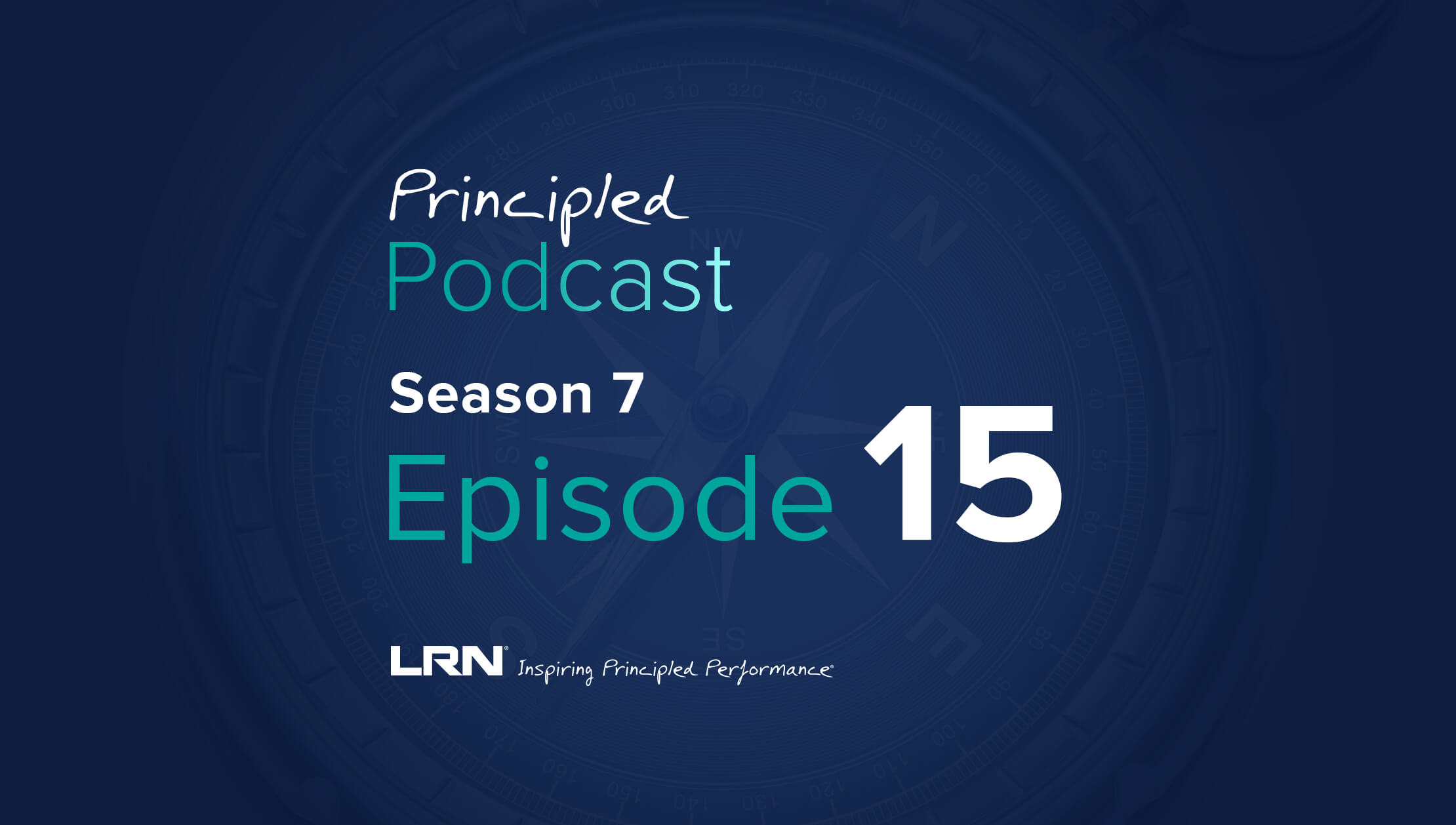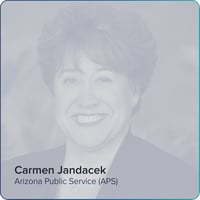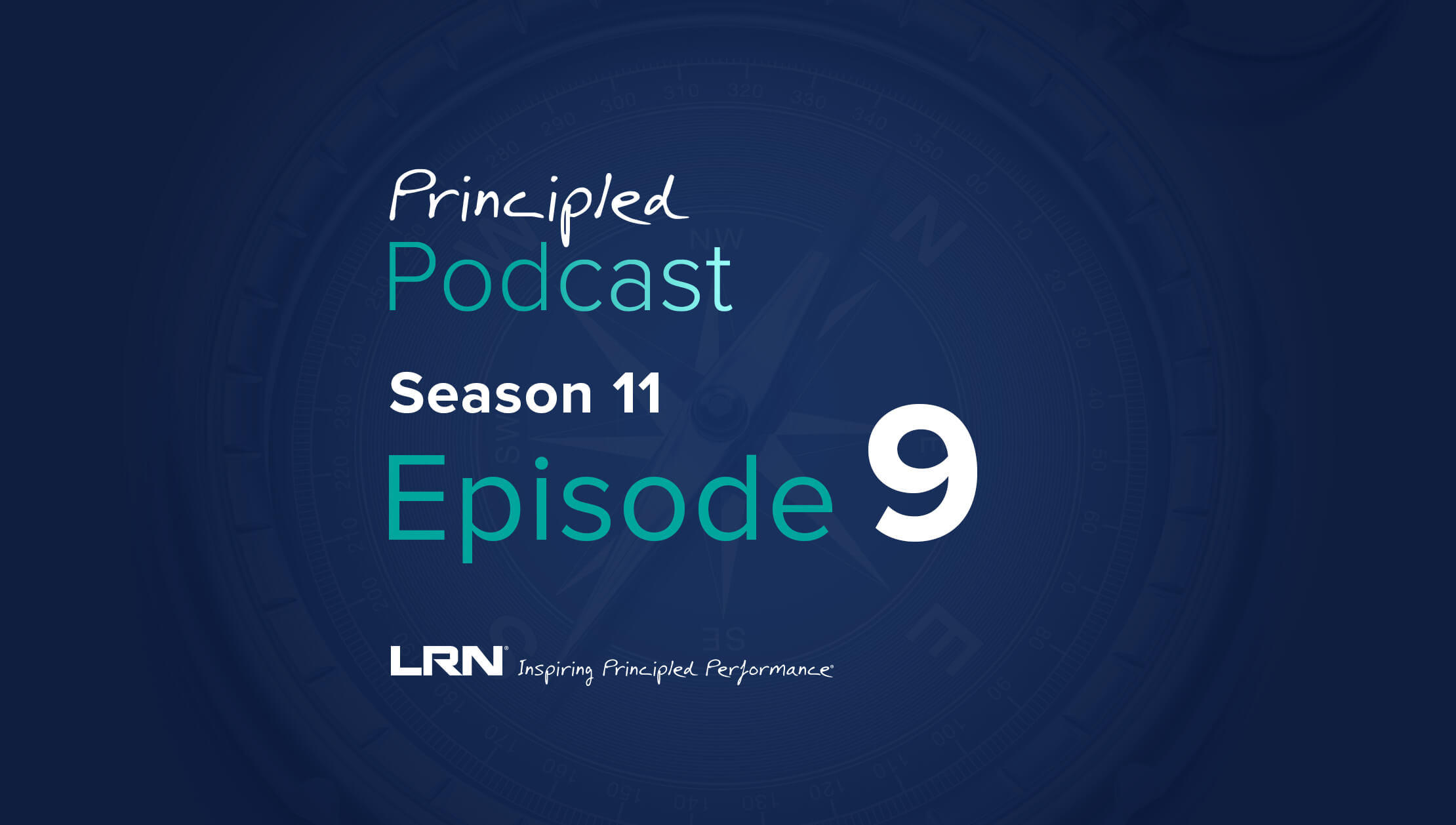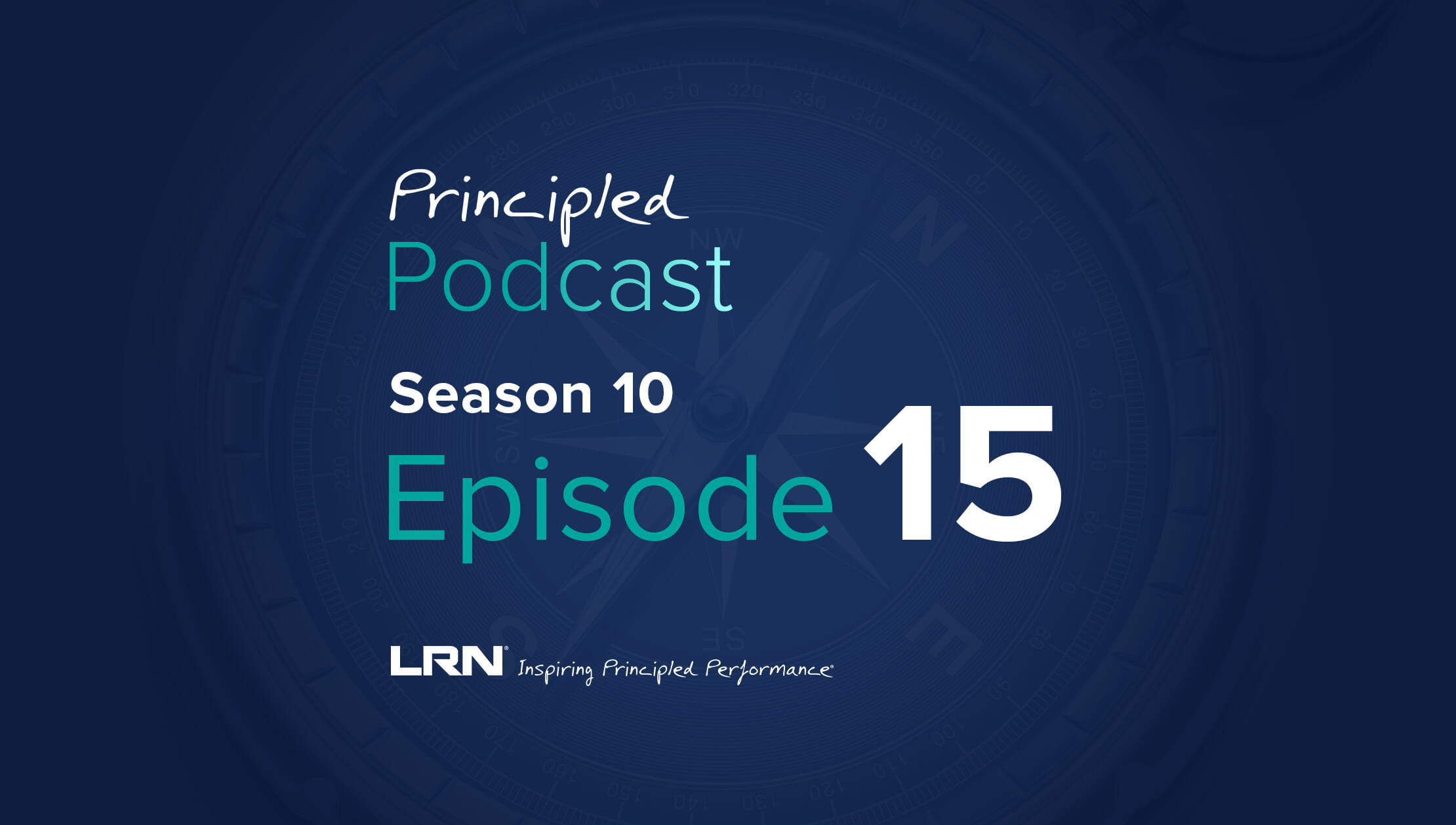What you'll learn on this podcast episode
Over the last 20 years, codes of conduct have undergone an evolution. Originally written as textbook-sized rulebooks, codes now seek to be visually engaging, readable, and useful guides to employees to help them do the right thing. And rather than covering all manner of what you can and cannot do, today’s codes aim to illustrate values-based principles of what you should and should not do. But these changes are no small task. How can organizations ensure they are designing and implementing their codes to deliver effective and meaningful change? In this episode of LRN’s Principled Podcast, Senior E&C Advisor Jim Walton talks about code reinvention with Carmen Jandacek, the Director of Ethics and Total Rewards at Arizona Public Service (APS). Listen in as the two discuss how APS reinvented their code of conduct to better reflect their organization’s culture, values, and employee experiences.
Principled Podcast Show Notes
- [2:02] - Carmen shares about her career background and getting into the ethics and compliance space.
- [4:07] - What is Arizona Public Service (APS)?
- [5:20] - The key drivers which led APS to undertake reinventing their code of conduct.
- [7:40] - The process of updating APS’s existing code.
- [10:11] - How was the code rewrite accepted among stakeholders?
- [12:10] - How did the reworked code turn out in the end?
- [13:35] - Carmen’s advice for other ethics and compliance teams who are thinking about
updating their own codes.
Where to stream
Be sure to subscribe to the Principled Podcast wherever you get your podcasts.
Guest: Virginia Addicott
Virginia Addicott recently retired as president and CEO of FedEx Custom Critical, a leading North American expedited freight carrier located in Green, Ohio. Virginia joined FedEx Custom Critical in 1986 and quickly worked her way up the ranks, holding director positions in various departments where she placed a strong focus on organizational culture, customer satisfaction and developing people.
In each role, Virginia used technology to improve productivity. By streamlining processes she has improved efficiency and enhanced communication capabilities to move the company forward.
Virginia has been recognized for her leadership both at work and in the community. In recent years she has been inducted into the Northeastern Ohio Business Hall of Fame (2013), received the Women of Power Award from the Akron Urban League (2013), and also received the Leadership Excellence Award from the National Diversity Council (2014). She has also been named to the Inside Business Power 100 list for the past six years (2011-2016) and the Crain’s Cleveland Business Power 150 (2014). She was also named honorary chair for the 2015 Bridgestone Invitational Tournament, the first-ever woman to be named honorary chairperson for the tournament.
Virginia earned a Bachelor of Science degree (‘85) and an EMBA (‘95) from Kent State University. In 2013 she was appointed by Ohio Governor John Kasich to the Kent State Board of Trustees. She is past chair of The Boys and Girls Club of the Western Reserve and past chair of the Greater Akron Chamber of Commerce. She also serves on a number of other boards, including Akron Children’s Hospital, the Akron Community Foundation and FIRST (For Inspiration and Recognition of Science and Technology).
Jim Walton is a member of LRN’s Ethics & Compliance Advisory Services Team – with over 25 years of professional experience in corporate, institutional and government settings, spanning the fields of ethics and compliance; environment, health and safety; and energy management.
Since 2002, Jim has been passionately dedicated to corporate ethics and compliance – designing, developing, implementing and enhancing constantly-evolving, comprehensive, best-in-class, global ethics and compliance programs. Jim has extensive experience in writing, producing and communicating codes of conduct and corporate policies; designing, managing and implementing ethics & compliance risk assessments; implementing anti-compliance and bribery initiatives; conducting third party due diligence reviews; and helping managers at all levels become better ethical leaders.
Jim is a Certified Compliance and Ethics Professional.
Principled Podcast Transcription
Intro: Welcome to the Principled Podcast, brought to you by LRN. The Principled Podcast brings together the collective wisdom on ethics, business and compliance, transformative stories of leadership, and inspiring workplace culture. Listen in to discover valuable strategies from our community of business leaders and workplace changemakers.
Jim Walton: Over the last 20 years, codes of conduct have undergone an evolution. Originally written as textbook-sized rule books, codes now seek to be visually engaging, readable, and useful guides to employees to help them do the right thing. Codes have also shifted their organizational priorities. Rather than covering all manner of what you can and cannot do, today's codes aim to illustrate values-based principles of what you should and should not do. But these changes are no small task; How can organizations ensure they are designing and implementing their codes to deliver effective and meaningful change?
Hello, and welcome to another episode of LRN's Principled Podcast. I'm your host, Jim Walton, Senior Ethics and Compliance Advisor at LRN. Today I'm joined by Carmen Jandacek, the Director of Ethics and Total Rewards at Arizona Public Service. We're going to be talking about how APS reinvented their code of conduct to better reflect their organization's culture, values, and employee experiences. Carmen has dedicated more than 26 years of her career to shaping the culture, ethics, and compliance at APS, and has real insight into how the company has evolved as a result of its new code of conduct. Carmen, thanks for joining us on the Principled Podcast.
Carmen Jandacek: Thanks. I'm just delighted to be here today.
Jim Walton: Wonderful. Just to start out, maybe you could tell us a little bit about yourself and how you came into the ethics and compliance field. I'm always fascinated at the journeys that we've all taken to get here.
Carmen Jandacek: Absolutely, and mine was absolutely not the traditional way of coming out of college and then going into an ethics and compliance career field. I came to work for APS in 1996, and I spent the first 15 years of my career there on the human resources team. At that point in time, I was really ready for a change. I spent really primarily my time in the space of total rewards, compensation and benefits, and I wanted to look at some other areas where I could expand my career also.
An opening came up in our ethics office, and I immediately fell in love with the work. In ethics, you have such an opportunity to not only reinforce and build ethical culture, but the ability to really be the voice of employees and the ethical coach for leaders. It's a really unique role that I have purview and sight to our entire organization, so I can identify trends or issues in one area of the organization and use that as a preventative opportunity and strategy to counsel and coach the rest of the organization. So from my perspective, ethics and compliance work is rich, it's never dull, and it's highly underrated. I think ethics and compliance organizations are the backstop to good governance at any organization.
Jim Walton: That's great. I couldn't agree more, and I think your unique background is really a wonderful add to the ethics and compliance community. It's always fascinating to me to see kind of the multifunctional, and the variety and diversity of backgrounds of ethics and compliance professionals, and it only adds to our effectiveness. So, thanks so much for that. I wondered if you could also just set the stage a little bit by giving us a little bit of background about Arizona Public Service, for those who might not know much about your company.
Carmen Jandacek: Sure. At APS, we are a subsidiary of Pinnacle West Capital Corporation. We have roughly 6,000 employees, and we serve 11 of the state's 15 counties. We're headquartered in Phoenix, but we are serving primarily the entire state of Arizona. In fact, more than 1.3 million homes and businesses are served by us, and we've made some very bold commitments. We're committed to providing a hundred percent clean, carbon-free electricity to customers by 2050, and we are well on our journey to doing so. We are 50% clean energy today. We also run Palo Verde Generating Station, the nation's largest clean energy producer that is west of Phoenix, and that's really the foundation of our future of carbon-free energy.
Jim Walton: Well, that's all very exciting. I know a big part of the commitments that APS is making were instrumental in wanting to rewrite and redesign your code of conduct, and we like to talk about reinventing a code of conduct. So, what were the key drivers that led you and the company to want to undertake this project?
Carmen Jandacek: Absolutely. It's been an interesting journey because I also was involved in rewriting the code that we had prior to this code rewrite. We were coming off of a code that was based on policy and procedure, that was framed in policy and procedure, and we had a couple key moments that really culminated in the work that we decided to do. First, we just went through a CEO change. In the CEO change, the CEO, Jeff Goldner, launched a significant culture change throughout the organization. So we wanted to make sure that all of what we were presenting in our code of ethical conduct embodied what that culture change was.
Part of the culture change was all about being customer-centric focus, and I fully believe that in order to really deliver on the customer experience, you have to deliver on the employee experience. So, providing frictionless delivery and service, and providing information in a way that is easy for our employees to utilize. So really what we were doing is, from a company perspective, building from the customer backwards to make sure they had a great experience, and I wanted to do the same thing from the code, making our employees with basically the customer of our product kind of front and center.
We also, as I just talked about, embarked on the bold new energy commitment to be a hundred percent clean by 2050, and that is really the backbone of the strong purpose that we have, and that needed to be really woven through all of the different documents and all of the different components of the code of ethical conduct. So all of that came together and culminated in us realizing that our current code was not going to help us bring those things to life, it was not going to allow us to bring and capture all of the change that was happening to us as an organization. So we knew that we couldn't just iterate what we had today, we had to completely reinvent that code to support these key initiatives and align with our cultural direction.
Jim Walton: Any of us that have gone through a code rewrite, update, reinvention, we know that it can be a daunting prospect. So I'm just wondering if you might be able to walk us through the process a little bit. So, now you've decided that you wanted to update the code. How did you actually go about it?
Carmen Jandacek: Daunting is pretty much an understatement, but very frankly, the LRN team made the complicated seem really easy for us. So we had to collaborate with over 30 different stakeholders and reviewers at APS, and it's never easy when you have that many editors, pulling all of those people together and capturing all of their comments to make sure that code was reflective of the important components that they had responsibility over. But all of the timing lined up. We had just deployed Microsoft Teams, and we created a Teams site, and had the reviewers put input in the one master document. And then I as the final editor either accepted or kept the comments that they had added.
Interestingly enough, and I have done this now a number of times where I've had to have really large documents with multiple stakeholders, we did something different this time. I had one of my colleagues go through and for every comment we didn't accept, we wrote a narrative as to why and sent it back to that person. I have never received as many thank-yous as I did by saying, "Wow, that's pretty awesome. Thanks for letting me know why you didn't accept that." Many times I'd never hear, and I thought, "Boy, that's something I'm keeping in the back of my mind for any future endeavors that I have, in whatever space it might be that closing that communication loop is so critical for people there."
After we solidified the content component and we then moved to layout, (and the layout portion was, again, a partnership with our creative team and the LRN creative team,) our final stop on the journey after that was getting our board's approval of our content. And then we actually shared the code during our annual training deployment that we do, and now we're getting ready to do Ethics Reinforcement Week. So we are getting ready to deploy the actual leader training and conversation guide that we created as part of this, and are excited to have that reinforcement opportunity for our leaders and employees.
Jim Walton: Wow. That sounds fascinating. I'm curious with the subject matter experts and the internal stakeholders, was there a difference in some people understanding why you were maybe trying to make it less policy-focused and more simple? Was there a difference across the board how different people viewed that, and did it take a while to get some people to understand that?
Carmen Jandacek: Absolutely. I think it did, and I think that this is part of the evolution of just codes of ethics and compliance period across not just only the utility industry, but just period that is occurring. For many years, (and I can remember looking back at the first codes that we had, too,) it was a document that you might have needed to have a legal background to even understand. It was thick, it sat on the shelf, and it had all of the prescriptive language of the dos and the don'ts.
We really wanted to make this something that people could use in the flow of work that covered of course our compliance-related things, but didn't use that as the lead and really tried to make this a more conversational, understandable document that people wouldn't really fear picking it up, thinking that it would be complicated to navigate or to get the information that I was looking for. So when you look at the utility industry period, we're very compliance-based. So, it's small steps to get us to that place, but I think really all of my team and all of the stakeholders approached it with a really strong growth mindset, and we leaned into making some of those changes to create the great product that we have today.
Jim Walton: That's great. Yeah, I always say it takes a village to make a good code. So, it sounds like you pulled all the people together that you needed to. How did it come out? What are you most proud of when you look at your code?
Carmen Jandacek: There are so many different things. First of all, it possibly is one of the most beautiful codes that I've ever seen, literally. The visual components of it are striking, and that's all part of pulling you in. That is all part of pulling you into the user-friendliness of the document, is its appeal when you open that up. It's easy to navigate. We've got all kinds of built-in navigation. We utilize different modalities. So we've got videos that are in there, we've got other different links that we have built into the document. It's engaging.
So it's something that as we put it on our internal intranet site, it's very easy to pull up and get to your answer in literally one to two clicks versus having to scroll through a document before. So not only is the content really rich, it speaks of us. It really represents who we are as APS, our values. What we call our "APS promises" thread through the entire document. So it has just lifted all of the efforts that we are doing and pulling them together. A really good resource for our employees.
Jim Walton: Well, that's really good to hear. That's kind of the dream of what we want a code of conduct to do in this day and age. So I'm really glad to hear that. Finally, just to close it out, what advice do you have for other ethics and compliance teams who are thinking about updating their codes?
Carmen Jandacek: I think certainly what we look to achieve and we did is moving from a legal document to a guidebook for our employees and our leaders, and code from my perspective can be one of the most powerful tools an organization can have to throttle success in the decision-making space, and in laying out cultural expectations. When I think of it from the eye of the employee, really from the user's point of view, that's what I want them to walk away with. Our business is changing so rapidly that what we used to think was okay from a refresh perspective every five years, that seems like an eternity now.
So we have to be more willing to update, accept, and reflect the new ways of working and new work expectations. COVID certainly has changed that component of it, also. And I think what really made this the incredibly rewarding kind of experience that we had was the strong partnership that we had with your team, which makes really an overwhelming effort seem very achievable. And when you bring the experience that your team brought to the table, it really allows us to deliver strongly for our employees.
Jim Walton: Well, clearly this is a conversation we could be having for hours, but unfortunately we're out of time for today. Carmen, thank you so much for joining me on this episode.
Carmen Jandacek: Jim, thanks so much. It's been an absolute pleasure being here today.
Jim Walton: My name is Jim Walton, and I want to thank you all for listening to the Principled Podcast by LRN.
Outro: We hope you enjoyed this episode. The Principled Podcast is brought to you by LRN. At LRN, our mission is to inspire principled performance in global organizations by helping them foster winning ethical cultures rooted in sustainable values. Please visit us at LRN.com to learn more. If you enjoyed this episode, subscribe to our podcast on Apple Podcasts, Stitcher, Google Podcasts, or wherever you listen, and don't forget to leave us a review.
Be sure to subscribe to the Principled Podcast wherever you get your podcasts.
















